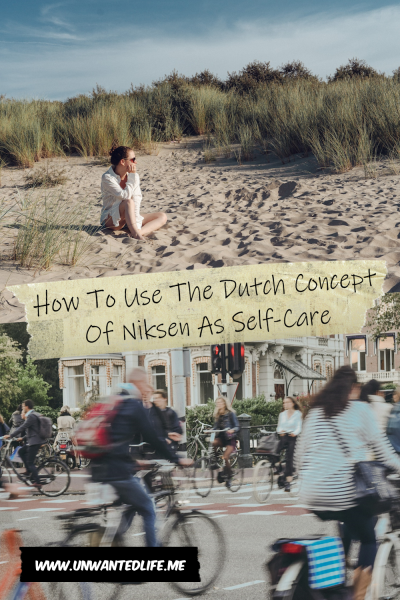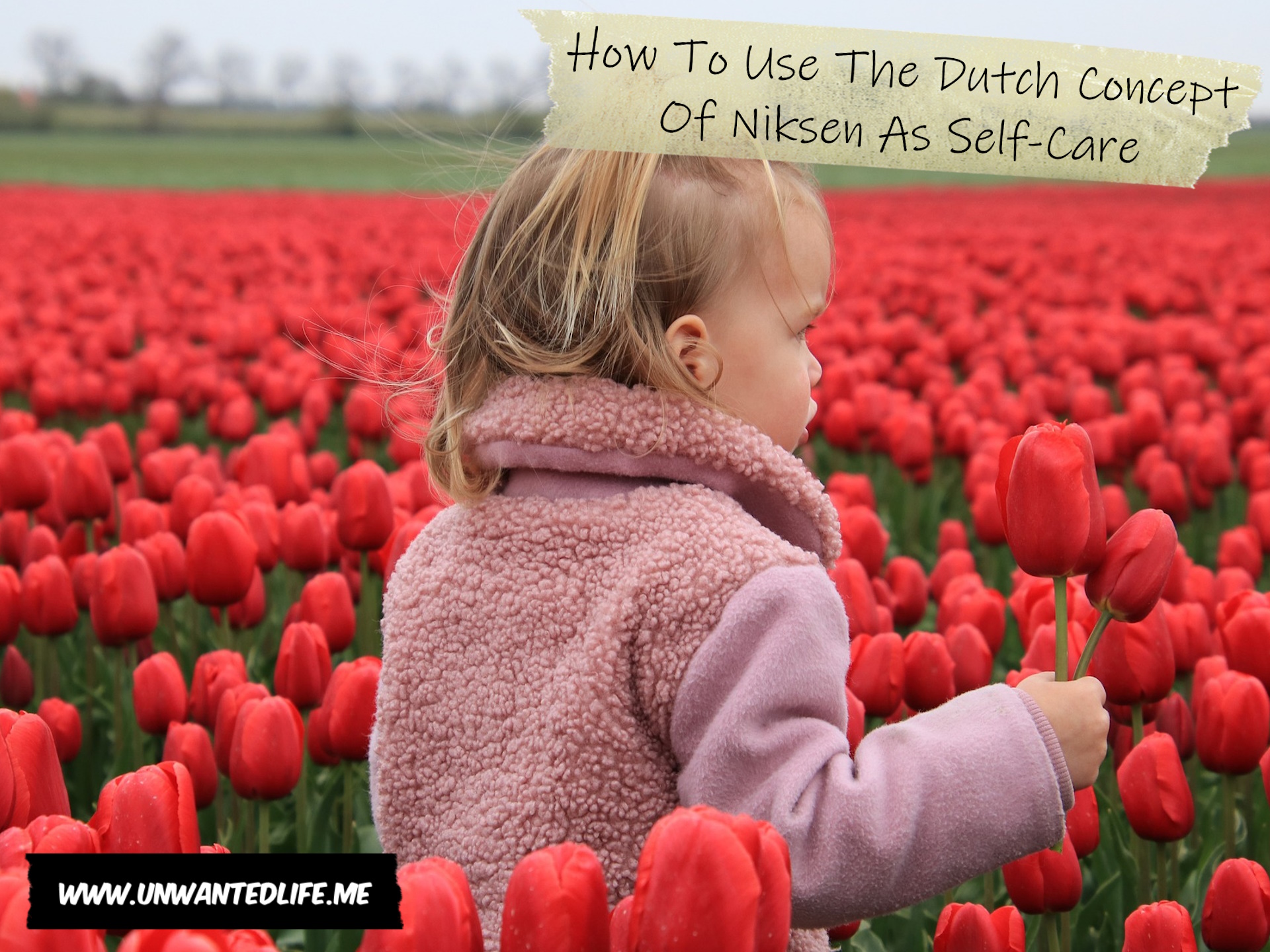I randomly came across an article on the Dutch concept of niksen, and it got me interested in learning more. The result of that curiosity is today’s article. I hope you enjoy it.
What Is Niksen?
According to the author Olga Mecking of the book ‘Niksen: Embracing the Dutch Art of Doing Nothing’, it’s common for people to struggle with how to define niksen. After all, we’re kind of always doing something, even while we sleep (Mecking, 2019). The definition I’ll be using is that the Dutch concept of niksen involves doing nothing, or more specifically, allowing the mind to wander freely without any specific purpose or goal.
Niksen, also sometimes referred to as “niks” (Rinne, 2021), appears to be growing in popularity, partly as a response to the hectic lifestyles we’re all now living (a lot like bed rotting), allowing someone to slow down, clear their mind, and be in the present (Ramgolam, 2019).
How To Benefit From Niksen
According to Gottfried (2019), there’s growing recognition from the medical community that doing nothing is a positive with several wellbeing benefits. The key to getting those benefits is to regularly, without intention or purpose, spend time, even as little as two minutes, doing nothing (Rinne, 2021). Not too dissimilar to some forms of meditation. However, this time isn’t meant to be used under the idea that it’ll be productive. Give niksen a try to see if you benefit from the following:
Reducing stress and anxiety
In today’s fast-paced world, many people are constantly on the go and feel overwhelmed by their to-do lists. Niksen encourages intentionally taking a break from the constant stimulation and busyness of modern life. These breaks from this constant activity allow the mind to relax, which can help reduce stress and anxiety.
Improve sleep
By reducing stress and anxiety, niksen can also help you fall asleep more easily and sleep more soundly.
Enhancing mindfulness
Niksen involves being present in the moment and letting go of distractions. This can help enhance mindfulness and increase awareness of one’s thoughts and feelings.
Boosting mood
Taking time to do nothing can be enjoyable and provide a sense of pleasure and contentment. This can help boost mood and improve overall wellbeing.
Improves focus
Disengagement from distractions can improve your ability to focus later on. The mental rest provided by niksen can sharpen your concentration and enhance your cognitive capacity, as well as improve productivity when you return to work or other activities.
Strengthen relationships
Taking breaks from busyness allows you to be more present and engaged in your interactions with others, leading to stronger relationships.
Letting go of control
By allowing yourself to simply “be” without the pressure to achieve or be productive, you release the mental strain associated with constant goal-oriented thinking. This can help reduce anxiety and feelings of being overwhelmed.
Unstructured thinking
When your mind isn’t focused on a specific task, it has the freedom to wander and make unexpected connections. This can lead to sudden bursts of inspiration, creative solutions to problems, and innovative ideas. These are often referred to as positive intrusive thoughts.
When we become stuck on something that needs solving, often taking a break from that allows our unconscious mind to keep working on the problem while our conscious mind is engaged in another task, or, in the case of niksen, engaging in the art of doing nothing as a form to relax.
According to Baird et al. (2012), there are anecdotes of individuals going back thousands of years, where problems are solved after giving up on trying to solve the issue.
Appreciation for the present
Niksen encourages you to be present in the moment and appreciate the simple things around you. This can boost your mood and foster a sense of gratitude for everyday experiences. This makes niksen a good mindfulness approach.
Improves creativity
When the mind is allowed to wander freely, it can lead to new ideas and insights. Niksen can help improve creativity (Gottfried, 2019) by giving the brain space to think and make connections that it might not otherwise make.
This is supported by Baird et al. (2012) study. They conducted a study on mind wandering on 145 participants, by getting the participants to engage in either a demanding task or an undemanding task that allowed for mind wandering. The results of that study supported the already existing evidence that mind wandering boosts creativity.
Another way to look at this is that tasks we can do on autopilot or when we’re just present, but doing nothing, can lead to daydreaming (Gottfried, 2019). That daydreaming can lead to creative ideas.
Increased self-awareness
Taking time for quiet introspection allows you to connect with your inner thoughts and feelings without judgment. This self-awareness can lead to better self-understanding and emotional regulation.
Downsides To Niksen
Those prone to overthinking or those who are depressed may find their mind wandering to more challenging thoughts, rather than relaxing (Gottfried, 2019). However, that doesn’t always have to be a bad thing. This may allow us to identify problem areas for us to work on, so you can improve our wellbeing. Keeping a journal nearby would help you capitalise on this, should it play out this way.

Summary
Overall, niksen can be a simple yet effective way to improve mental wellbeing by allowing the mind to rest and recharge. It can be practised anytime, anywhere, and doesn’t require any special skills or equipment.
You don’t have to spend hours doing nothing. Even short periods of intentional relaxation can be beneficial. Find what works for you. Whether it’s gazing out the window, listening to calming music, or simply taking a few deep breaths, find activities that help you truly unwind and disconnect. By incorporating niksen into your daily routine, you can cultivate a sense of calm, enhance your creativity, and improve your overall mental well-being.
Remember, niksen is not about laziness or procrastination. It’s about consciously choosing to disconnect and allowing your mind and body to rest and recharge.
As always, leave your feedback in the comments section below. Also, please share your experiences with niksen and doing nothing in the comments section below as well. Don’t forget, if you want to stay up-to-date with my blog, you can sign up for my newsletter below. Alternatively, click the red bell icon in the bottom right corner to get push notifications for new articles.
Lastly, if you’d like to support my blog, then there are PayPal and Ko-fi donation payment options below. Until next time, Unwanted Life readers.
References
Baird, B., Smallwood, J., Mrazek, M. D., Kam, J. W., Franklin, M. S., & Schooler, J. W. (2012). Inspired by distraction: Mind wandering facilitates creative incubation. Psychological science, 23(10), 1117-1122. Retrieved from https://labs.psych.ucsb.edu/schooler/jonathan/sites/labs.psych.ucsb.edu.schooler.jonathan/files/pubs/inspired_by_distraction.pdf.
Gottfried, S. (2019). Niksen is the Dutch lifestyle concept of doing nothing—and you’re about to see it everywhere. Time. https://time.com/5622094/what-is-niksen.
Mecking, O. (2019). The Case for Doing Nothing. New York Times, 29. Retrieved from https://www.sjsu.edu/ccll/docs/The%20Case%20for%20Doing%20Nothing%20NYT.pdf.
Ramgolam, D. R. (2019). Temporal sense & sensibilities in the landscape of media addiction. Media Ethics Magazine, 31(1). Retrieved from https://www.mediaethicsmagazine.com/index.php/browse-back-issues/213-fall-2019/3999277-temporal-sense-sensibilities-in-the-landscape-of-media-addiction.
Rinne, A. (2021). Run Slower: The New Superpower For Our Sped Up World. Retrieved from https://www.porchlightbooks.com/globalassets/changethis/203–august-2021/pdfs/203.03.flux.pdf.


That’s awesome, it’s nice to it can improves these things. Well, I did not know the dutch concept so this was interesting read as well.
Thanks for commenting
This is an amazing blog post and very informative. I never knew that such a thing had a specific term but as someone who struggles with mental health I can truly find this information useful. I think it’s a great idea to unburden ourselves and allow ourselves to become more casual in the way we approach life. We can still be productive all while choosing not to let things burden us so much. I think there’s some very important key info here.
Exactly. Life is already stressful enough, so why not go completely casual in our approach to life
Great article. Self care, no matter what country you live in is so imporant.